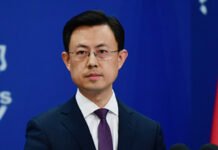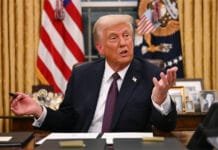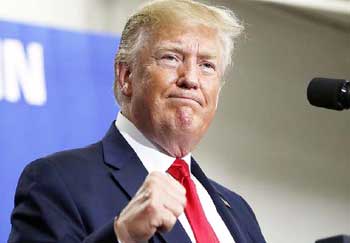Florida Governor Ron DeSantis has once again ignited a national debate on the H-1B visa program, calling it a “complete fraud” that threatens the livelihood of American workers. In a forceful interview on Fox News, DeSantis accused multinational corporations of exploiting the system to replace skilled American employees with cheaper foreign labor, primarily from India. His remarks have placed immigration and employment back in the spotlight as the Trump administration considers sweeping changes to the U.S. visa and immigration system.
DeSantis: H-1B Visa Has Become a Fraudulent System
During his interview with Laura Ingraham, DeSantis emphasized that the H-1B visa program—originally designed to bring the best and brightest global talent to America—has devolved into a scheme benefiting select industries. According to him, many companies train American workers alongside H-1B visa holders, only to fire those American employees once the foreign workers are ready to take over their roles.
“This method is unacceptable and is directly harming American workers,” DeSantis said, underlining that the H-1B program has become a tool for corporate exploitation rather than national growth.
The Rise of Job Displacement and Corporate Abuse
Critics of the H-1B system have long argued that corporations prioritize profits over patriotism. By hiring foreign workers at lower wages, companies can reduce labor costs while pushing experienced American employees out of the job market. DeSantis stressed that such practices undermine American workers’ rights, diminish wages, and force qualified U.S. citizens to struggle for employment opportunities that should rightfully belong to them.
This alleged manipulation is especially prevalent in the technology and IT outsourcing industry, where the majority of H-1B visa holders originate from India. DeSantis stated that an entire industry of visa sponsorship and outsourcing companies has been created around this system, funneling jobs away from Americans into the hands of foreign workers.
DeSantis Rejects the “Best and Brightest” Narrative
While the H-1B visa was promoted as a means to attract exceptional global talent, DeSantis dismissed this claim as outdated and misleading. He argued that the program is no longer about innovation or competitiveness but rather about mass importing workers from a single country to fulfill the needs of corporations looking for cost savings.
“Earlier it was said that we are bringing the most talented people from all over the world. But the truth is, that is not happening with the H-1B visa,” DeSantis said.
By concentrating primarily on workers from one region, DeSantis argued, the system has lost its meritocratic essence and has instead become a pipeline dominated by a handful of outsourcing firms.
Artificial Intelligence and the Future of American Jobs
When questioned about the impact of Artificial Intelligence (AI) on young American workers, DeSantis raised a critical point: if automation is already threatening the job market, why should the United States further undermine domestic employment by importing foreign labor?
He noted that the priority should be to provide employment for U.S. citizens first, ensuring that Americans have access to job opportunities before the government approves additional foreign workers under temporary visa schemes.
Trump Administration’s Immigration Shift: Gold Card Program
DeSantis’ sharp criticism coincides with reports that the Trump administration is preparing to launch a new “Gold Card” program. This initiative would allow wealthy foreign nationals to live in the United States if they invest at least $5 million into the American economy.
According to U.S. Commerce Secretary Howard Lutnick, nearly 250,000 people are in line to apply, with potential revenue estimated at $1.25 trillion. Unlike the H-1B visa, which focuses on workers, the Gold Card is designed to attract high-net-worth individuals who can bring direct investment into the country.
Trump’s Mixed Stance on H-1B Visa
Although DeSantis’ remarks appear to clash with President Trump’s recent support of the H-1B program, the issue remains a point of division within the administration. In January 2025, Trump reiterated his belief that America needs “qualified and great people” and suggested that the H-1B visa could be a valuable tool to attract such talent.
However, Trump’s earlier positions have been far more critical. In 2016, he lambasted the program as a loophole for corporations to replace American workers with lower-paid foreign employees. During his first term, his administration imposed stricter rules on visa applications, citing abuse of the system and its burden on the U.S. economy.
This ongoing policy tug-of-war highlights the political sensitivity of the H-1B debate, balancing the need for innovation with the imperative to protect American jobs.
Why DeSantis’ Criticism Resonates With American Workers
DeSantis’ fiery remarks resonate with many American workers who feel displaced, undervalued, and ignored. His assertion that the H-1B program is a “complete scam” reflects the frustration of thousands of professionals who have watched their jobs outsourced or handed to foreign workers.
His focus on fair employment practices, combined with a demand for greater accountability from corporations, appeals to a growing voter base concerned with job security, wage stability, and national sovereignty.
The Role of India in the H-1B Visa Program
Statistics consistently show that a majority of H-1B visas are awarded to Indian nationals, largely due to the dominance of Indian IT companies and outsourcing firms. While many of these professionals are highly skilled, critics argue that the volume of applications from a single country has created an imbalance in the program.
DeSantis’ claim that an “entire industry has been set up” reflects growing concerns about the monopolization of U.S. work visas by specific industries and regions, rather than a truly global competition for talent.
Future of U.S. Immigration and Employment Policy
With the 2025 presidential race intensifying, the debate over H-1B visas, immigration reform, and job protection will remain at the forefront of American politics. Lawmakers face increasing pressure to restructure the system, ensuring that it both supports economic growth and protects U.S. workers.
Possible reforms include:
Capping visas by industry to prevent monopolization.
Increasing wage requirements to discourage cheap labor exploitation.
Limiting visa renewals to encourage true talent acquisition rather than long-term replacement of Americans.
Prioritizing domestic training programs to empower U.S. workers in technology, engineering, and AI-driven industries.
















